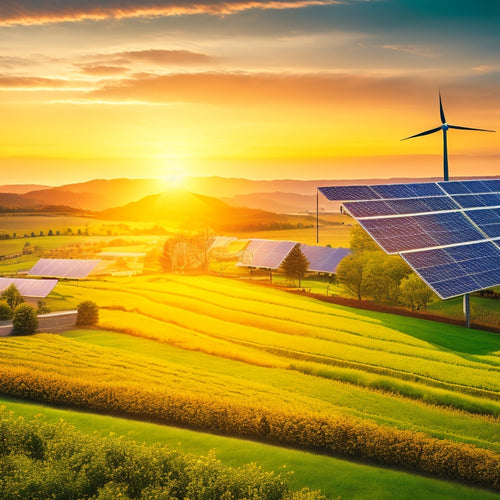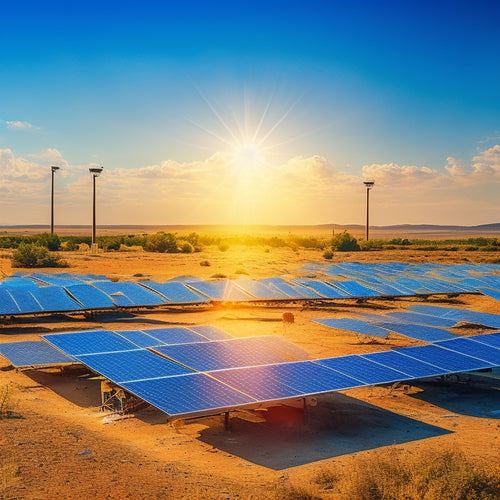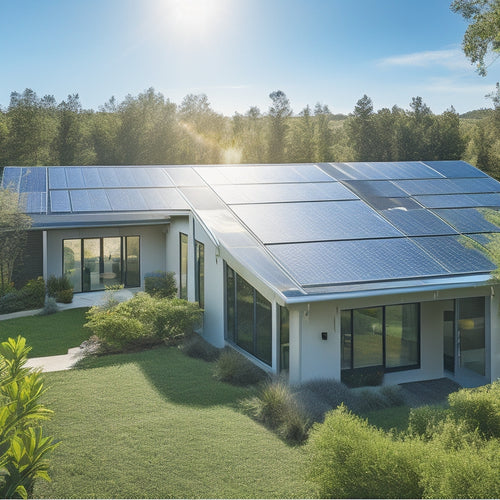
Why Choose Solar Power for Remote Cabins?
Share
You're considering solar power for your remote cabin because you want a reliable, cost-effective, and eco-friendly energy source that aligns with your off-grid lifestyle. Solar power reduces your carbon footprint, promotes energy independence, and is ideal for areas with limited traditional infrastructure. It also offers cost savings, increases property value, and has government incentives available. With proper system sizing and maintenance, solar power provides a sustainable energy solution. By choosing solar power, you're contributing to a cleaner environment and setting an example for others. As you explore this option, you'll discover more benefits that align with your values and needs.
Key Takeaways
• Solar power reduces carbon footprint and promotes environmental stewardship, aligning with eco-friendly lifestyle in remote areas.
• Energy independence through solar power ensures a reliable energy supply, shielding from price volatility and supply chain disruptions.
• Solar power is cost-effective, offering fuel savings, lower operating costs, and increased property value, with government incentives available.
• Properly installed and maintained solar power systems can thrive in areas with limited traditional infrastructure, making them ideal for remote cabins.
• By choosing solar power, remote cabin owners can promote climate consciousness, contribute to a cleaner environment, and set an example for others.
Renewable Energy for Remote Living
When living remotely, you likely rely heavily on fossil fuels for energy, but incorporating renewable energy sources into your off-grid lifestyle can greatly reduce your carbon footprint and dependence on non-renewable resources. As you consider alternatives, it's crucial to evaluate the rural infrastructure in your area to determine the feasibility of renewable energy integration. For instance, you may need to assess the availability of sunlight, wind patterns, and access to water resources. By doing so, you can identify the most suitable renewable energy source for your specific location.
Incorporating renewable energy sources not only reduces your reliance on fossil fuels but also promotes environmental stewardship. As you make the shift to renewable energy, you'll be minimizing your impact on the environment and contributing to a more sustainable future. By adopting renewable energy solutions, you'll be setting a positive precedent for responsible rural development, aligning with the principles of environmental stewardship. By making this conscious choice, you'll be doing your part to protect the natural beauty of your remote surroundings for generations to come.
Energy Independence for Off-Grid
By harnessing renewable energy, you're not only reducing your carbon footprint but also taking a significant step towards energy independence, liberating yourself from reliance on external power grids and fuel deliveries. This self-sufficiency mindset allows you to break free from the constraints of traditional energy sources and take control of your energy needs.
With off-grid solar power, you can guarantee a reliable and consistent energy supply, even in remote areas with limited access to traditional infrastructure.
Energy independence also means grid resilience, where you're less affected by power outages or disruptions to the main grid. This is particularly important for remote cabins, where access to essential services can be limited. By generating your own clean energy, you're shielding yourself from price volatility and supply chain disruptions, ensuring a more stable and secure energy future.
With solar power, you can enjoy the peace of mind that comes with being energy-independent, focusing on the things that matter most – enjoying your remote cabin retreat.
Solar Power for Remote Areas
You'll often find that remote areas, where traditional grid connections are scarce or non-existent, are ideal locations for harnessing solar power, thanks to the abundance of sunlight and lack of infrastructure. This makes solar power an attractive option for powering your remote cabin.
When considering solar power for your remote area, keep the following factors in mind:
-
Panel Orientation: Make sure that your solar panels are installed at an ideal angle to maximize energy production.
-
Battery Maintenance: Regularly inspect and upkeep your battery bank to guarantee efficient energy storage and prolong its lifespan.
-
Shading: Be mindful of potential shading from trees or surrounding structures, which can significantly impact energy production.
- System Sizing: Properly size your solar power system to meet your energy demands, taking into account factors like energy efficiency and load requirements.
Reduced Carbon Footprint Benefits
Your decision to opt for solar power greatly reduces your carbon footprint, contributing to a cleaner environment and a healthier planet. By harnessing the power of the sun, you're reducing your reliance on fossil fuels and decreasing the amount of greenhouse gases emitted into the atmosphere. This not only benefits the environment but also promotes a sense of climate consciousness.
| Benefits | Description |
|---|---|
| Reduced Carbon Emissions | Lower greenhouse gas emissions contribute to a cleaner environment |
| Eco-Friendly Lifestyle | Solar power aligns with an eco-friendly lifestyle, promoting sustainability |
| Climate Consciousness | You're contributing to a cleaner planet, setting an example for others |
As you make the switch to solar power, you're taking a significant step towards reducing your carbon footprint. By doing so, you're not only benefiting the environment but also promoting a sense of climate consciousness. By choosing solar power, you're actively contributing to a cleaner, healthier planet for future generations.
Cost-Effective Off-Grid Solution
How much are you willing to pay for energy independence, and does the cost outweigh the benefits of relying on traditional power sources?
When considering solar power for your remote cabin, it's essential to weigh the costs and benefits. Solar power can be a cost-effective off-grid solution, especially when you achieve Grid Parity – the point where the cost of solar energy is equal to or less than traditional power sources.
Here are four key benefits of choosing solar power:
-
Fuel Savings: Solar power eliminates the need for fuel deliveries, reducing your reliance on diesel generators and the associated fuel costs.
-
Lower Operating Costs: With solar power, you'll reduce your maintenance and repair costs, as there are fewer moving parts compared to traditional generators.
-
Increased Property Value: Installing solar power can increase your property value, making your remote cabin more attractive to potential buyers.
- Government Incentives: You may be eligible for government incentives, such as tax credits or rebates, which can help offset the initial installation costs.
Frequently Asked Questions
Can Solar Panels Perform Well in Areas With Frequent Shading?
You'll find that solar panels can still perform well in areas with frequent shading, but it's essential to minimize the shading impact through tree pruning and strategic panel placement to optimize energy output.
How Do I Ensure Solar System Maintenance in Remote Areas?
To guarantee solar system maintenance in remote areas, you'll want to invest in battery monitoring systems and schedule regular remote inspections to identify potential issues before they become major problems.
Are Solar Power Systems Resistant to Extreme Weather Conditions?
You'll be relieved to know that solar power systems are designed with weather durability in mind, ensuring climate resilience in extreme conditions, such as heavy snowfall, high winds, and scorching temperatures.
Can I Use Solar Power for Heating and Cooling My Cabin?
You can use solar power for heating and cooling your cabin by incorporating thermal storage and prioritizing insulation importance to maintain a stable temperature, ensuring efficient energy distribution and minimizing losses.
Do Solar Panels Require Frequent Cleaning for Optimal Performance?
You'll find that solar panels don't require frequent cleaning, as dust accumulation is minimal; however, occasional cleaning after heavy dust storms or prolonged dry spells is recommended, and rainwater harvesting can be a convenient cleaning solution.
Related Posts
-

Net Metering in Renewable Energy's Future
Net metering's future is vital for driving renewable energy growth and financial savings. You can reduce your electri...
-

What Happens Without a Charge Controller in Solar Panels
Without a charge controller in your solar panel system, you risk overheating batteries due to overcharging, which can...
-

Installing Metal Solar Roofs for Maximum Energy Efficiency
Installing metal solar roofs can drastically enhance your home's energy efficiency and durability. These roofs withst...


